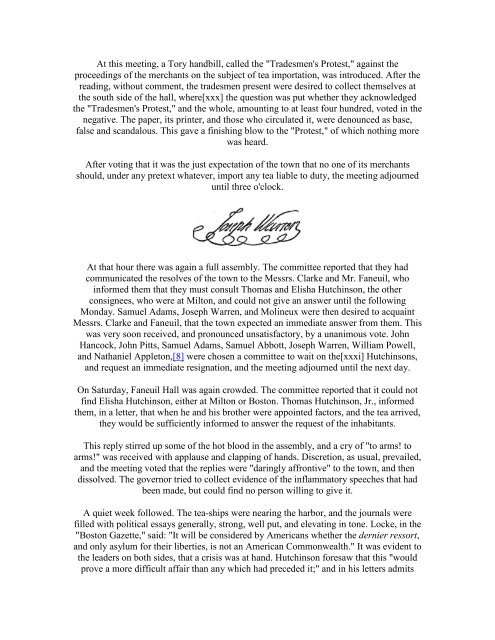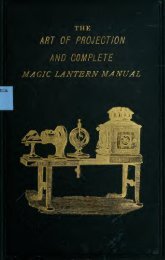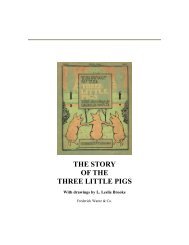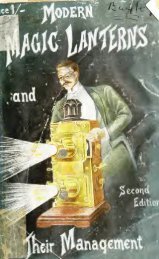TEA LEAVES: - Yesterday Image
TEA LEAVES: - Yesterday Image
TEA LEAVES: - Yesterday Image
Create successful ePaper yourself
Turn your PDF publications into a flip-book with our unique Google optimized e-Paper software.
At this meeting, a Tory handbill, called the "Tradesmen's Protest," against the<br />
proceedings of the merchants on the subject of tea importation, was introduced. After the<br />
reading, without comment, the tradesmen present were desired to collect themselves at<br />
the south side of the hall, where[xxx] the question was put whether they acknowledged<br />
the "Tradesmen's Protest," and the whole, amounting to at least four hundred, voted in the<br />
negative. The paper, its printer, and those who circulated it, were denounced as base,<br />
false and scandalous. This gave a finishing blow to the "Protest," of which nothing more<br />
was heard.<br />
After voting that it was the just expectation of the town that no one of its merchants<br />
should, under any pretext whatever, import any tea liable to duty, the meeting adjourned<br />
until three o'clock.<br />
At that hour there was again a full assembly. The committee reported that they had<br />
communicated the resolves of the town to the Messrs. Clarke and Mr. Faneuil, who<br />
informed them that they must consult Thomas and Elisha Hutchinson, the other<br />
consignees, who were at Milton, and could not give an answer until the following<br />
Monday. Samuel Adams, Joseph Warren, and Molineux were then desired to acquaint<br />
Messrs. Clarke and Faneuil, that the town expected an immediate answer from them. This<br />
was very soon received, and pronounced unsatisfactory, by a unanimous vote. John<br />
Hancock, John Pitts, Samuel Adams, Samuel Abbott, Joseph Warren, William Powell,<br />
and Nathaniel Appleton,[8] were chosen a committee to wait on the[xxxi] Hutchinsons,<br />
and request an immediate resignation, and the meeting adjourned until the next day.<br />
On Saturday, Faneuil Hall was again crowded. The committee reported that it could not<br />
find Elisha Hutchinson, either at Milton or Boston. Thomas Hutchinson, Jr., informed<br />
them, in a letter, that when he and his brother were appointed factors, and the tea arrived,<br />
they would be sufficiently informed to answer the request of the inhabitants.<br />
This reply stirred up some of the hot blood in the assembly, and a cry of "to arms! to<br />
arms!" was received with applause and clapping of hands. Discretion, as usual, prevailed,<br />
and the meeting voted that the replies were "daringly affrontive" to the town, and then<br />
dissolved. The governor tried to collect evidence of the inflammatory speeches that had<br />
been made, but could find no person willing to give it.<br />
A quiet week followed. The tea-ships were nearing the harbor, and the journals were<br />
filled with political essays generally, strong, well put, and elevating in tone. Locke, in the<br />
"Boston Gazette," said: "It will be considered by Americans whether the dernier ressort,<br />
and only asylum for their liberties, is not an American Commonwealth." It was evident to<br />
the leaders on both sides, that a crisis was at hand. Hutchinson foresaw that this "would<br />
prove a more difficult affair than any which had preceded it;" and in his letters admits





